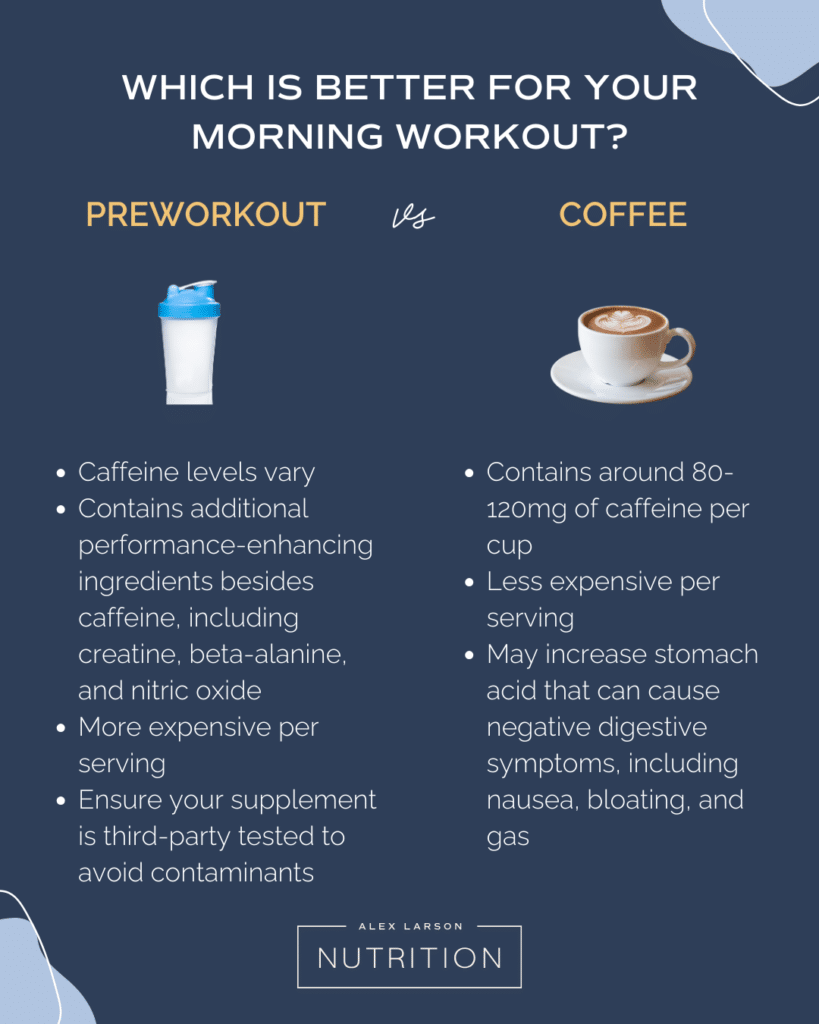RUNNING →
Level Up Your Nutrition Game With Our Freebies
Alex
I provide nutrition coaching for endurance athletes to improve performance and body composition through a simple and flexible eating style.
Hi, I'm
ATHLETE EATING GUIDE →
PROTEIN →
TRIATHLON →
RECIPES →
PERFORMANCE NUTRITION →
SUPPLEMENTS →
HOLIDAY & TRAVEL →
PLANT-BASED →
FEMALE ATHLETE NUTRITION
Explore the Blog
LEARN MORE →
ATHLETE GROCERY SHOPPING GUIDE →
RACE DAY: TRIATHLON NUTRITION PLANNER →
READY TO FUEL?
incredible value!
The fueling guide bundle serves as your one-stop-shop for strategies to fueling before, during and after your workouts.
ENDURANCE EATS
BINGE-WATCH READY!
YOUTUBE SERIES
Many endurance athletes grapple with the decision of whether to consume a preworkout vs coffee before embarking on their morning workout routines. These choices offer distinct advantages and potential drawbacks, impacting energy levels, focus, and overall exercise performance.
Whether it’s the caffeine kick of coffee or the comprehensive blend of ingredients in pre-workout supplements, understanding the nuances of each option can help you make an informed decision to maximize the benefits of your early morning sweat sessions. Read on to discover if pre-workout vs coffee is the right option to supplement your early morning miles.
The Science Behind Coffee

Ring ring! The absurdly early alarm clock goes off yet again for another early morning workout. You are bribing yourself with an early morning cup of joe if you get those much-needed miles in. Fortunately, you are not alone in this occurrence. Many endurance athletes rely on a cup of coffee (or two) to fuel those morning miles.
Coffee is more than just a morning pick-me-up; it’s a fascinating concoction of science. Each cup of coffee typically contains between 80-120mg of caffeine. However, this does vary slightly and is contingent on how generous of a pour you have and how strong you like your brewed coffee.
Caffeine stimulates your central nervous system, heart, and muscles. So how does this make you feel less sleepy? Well, your body produces a substance called adenosine that promotes sleepiness. Caffeine blocks your adenosine receptors, keeping you from feeling sleepy. While this is not the only function inside your body that caffeine acts on, it is one of the primary ways that caffeine promotes focus and provides energy before those morning miles.
The Pros and Cons of Coffee for Morning Workouts
It is important to be aware of both the pros and cons of your morning cup of joe to fuel those miles.
Pros- Research shows that caffeine can increase alertness and increase time to exhaustion though this is more pronounced in non-caffeine users than in regular consumers. Endurance athletes also love caffeine for a reason: it can have ergogenic benefits for athletic performance including:
- Increases focus and alertness while reducing fatigue
- Enhances endurance and stamina
- Improves strength and power output
- Decreases pain sensations
Caffeine is absorbed in the gastrointestinal tract and quickly metabolized by the liver. It begins circulating in the bloodstream within 15-45 minutes of consumption, with peak concentration appearing an hour after consumption. Some endurance athletes also find a modest morning cup of joe can help produce a welcomed bowel movement before a workout or race. Though again this varies largely on the individual.
Cons- “Too much of a good thing” may persist if you find yourself overly relying on caffeine and coffee to get you through your workouts. This can lead to unwanted consequences like increased jitters, anxiety, sleep disruption and insomnia subsequently in the day. Excessive consumption of coffee and caffeine can also make it more difficult to get in those important hydrating beverages such as water and sports drinks before your workouts.
Furthermore, too much caffeine can lead to “runners trots” and unwanted gastrointestinal issues. Studies have shown that up to 50% of athletes have dealt with some form of GI issue during training and/or racing. Studies have also indicated that caffeine, especially coffee, can increase the amount of acid in your stomach, which may cause digestive issues. Symptoms can include nausea, acid reflux, poor digestion, discomfort/bloating, and excessive gas.
The Power of Pre-workout Supplements

If coffee isn’t your thing (me either), fortunately, there are other options if you need a morning pick-me-up. Pre-workout supplements are increasing in popularity to give endurance athletes a similar boost before an early morning workout. Pre-workout supplements vary across a large spectrum but may contain ingredients such as caffeine, creatine, beta-alanine, and nitric oxide, among other ingredients. Let’s run you through (see what I did there?) a few common ingredients, in addition to caffeine, that you may see in many popular pre-workout supplements:
Creatine.
Creatine is a type of amino acid, which is the building block that makes up protein. Nutrition supplements, including pre-workout, often contain creatine because it has been extensively researched in helping to increase energy and decrease muscle fatigue during exercise.
Beta-Alanine.
Beta-alanine is a naturally occurring non-essential amino acid that serves as a building block for carnosine, which is found in muscle tissue. It has been researched in helping to delay the onset of muscle fatigue during exercise by buffering hydrogen ions.
Nitric oxide.
Nitric oxide helps relax and dilate blood vessels, leading to improved blood flow and regulation of blood pressure. This molecule plays an important role in decreasing blood pressure, neurotransmission (the transfer of information between neurons), and immune responses.
Branch Chained Amino Acids (BCAAs).
BCAAs, in particular, are three essential amino acids: leucine, isoleucine, and valine, and must be obtained through food sources or nutrition supplementation. BCAAs play a crucial role in muscle protein synthesis, and energy production, and can potentially reduce muscle soreness and fatigue after exercise. BCAA supplements are often consumed by athletes to support muscle recovery and improve exercise performance.
Electrolytes.
Electrolytes are essential minerals (sodium, potassium, magnesium, calcium, among others) that support hydration. Adequate electrolytes help athletes sustain blood flow/volume to the heart, distribute nutrients to cells, and enhance their metabolism. If athletes do not maintain a proper fluid balance, it can lead to a decrease in performance ability. Electrolytes are often found in pre-workout supplements to help replenish the minerals that are lost in sweat during exercise.
This is not a comprehensive list of ingredients found in pre-workout supplements as each brand and formulation is unique.

Timing Matters
If you are looking to utilize caffeine or a pre-workout supplement that contains caffeine, before your pre-morning workout, it is important to consider timing. Your blood caffeine levels tend to peak about an hour after you consume caffeine in any form, whether it is coffee or in a pre-workout supplement. It is important to keep this in mind and take your caffeine ~1 hour before you want its effects to peak. Unfortunately, this may imply that you are setting that absurdly early alarm clock even earlier.
Dosage is also an important consideration when relying on caffeine, so be sure to review our caffeine and athletic performance blog for more tips!
Finding Your Fit: Personal Preferences Matter

Fortunately, there are countless other beverage options to experiment with in addition to coffee and pre-workout supplements. Caffeinated tea, energy drinks, and sports drinks are also other go-to’s for boosting those morning workouts. Caffeinated gels, caffeine pills, and caffeinated gum are also options that are commonly available for endurance athletes.
If you are looking into a supplement, as this performance nutrition post discusses, it is important to make sure that you are opting for high-quality nutrition supplements. Be sure to purchase a pre-workout supplement that is third-party tested such as Informed Choice for Sport or NSF-certified. A supplement brand that I love and trust is Thorne Research! You can use this link to get 15% off your order. Unfortunately, there are many low-quality products available that have tested positive for various substances, including heavy metals and contaminants.
Furthermore, it is always important to speak with your medical care provider before starting any nutrition supplement. Some products have the potential to do more harm than good.
Preworkout vs Coffee: Cheers to Your Morning Exercise Routine!
You asked: “Pre-workout vs. coffee- which one is better for a morning workout?” Well, ultimately that decision is up to you! Whether you choose to fuel those miles caffeinated or decaffeinated (ha!), you can experiment with a wide variety of products and come to a conclusion. All in all, caffeine is a relatively safe and effective performance enhancer when used properly. As long as you take into account the dosage and timing considerations, there are generally minimal side effects. Pre-workout supplements can also be a good option too!
Are you feeling lost when it comes to performance nutrition? Are you ready to hit that next PR on race day? Working with a specialized sports dietitian is one of the best ways to maximize your performance as an athlete.
Looking for personalized support with your endurance nutrition?
We have limited spots available for our 1:1 nutrition coaching services. Make sure to apply today to secure your spot just in time for your next big race! There is no better time to invest in your health.
Alex
I provide nutrition coaching for endurance athletes to improve performance and body composition through a simple and flexible eating style.
Hi, I'm
LEARN MORE →
take the quiz!
Let's discover your Endurance Nutrition IQ
How well do you know your fueling? Answer these questions and let's see where your endurance nutrition knowledge is at!
Take the quiz
level up your nutrition game with these freebies
free downloadS
Protein-Packed 10-Day Sample Meal Plan
Athlete Eating Guide
Athlete Grocery Shopping Guide
1
2
3
Inspiration to fit 120 grams of protein into your day
Planning what goes on your plate
Putting the right foods in your grocery cart
